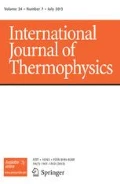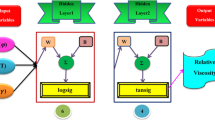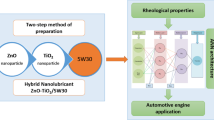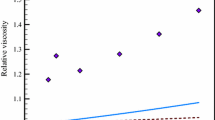Abstract
In the current work, the viscosity of hybrid WO3-MWCNTs/Engine Oil nanofluids for the different volume fraction of nanoparticles (φ), temperatures, and shear rates has been measured, and then using Artificial Neural Network (ANN) has been predicted. The statistical reports of ANN have been presented in figures and tables, and it could be found that the designed ANN has an acceptable accuracy in predicting the viscosity of hybrid nanofluids. It can be seen that the optimum neuron number for this data set is 39 and the ANN outputs are very close to the experimental data points. Finally, it is found that in the fitting method, the correlation between experimental data points and the output values is 0.999 424, but in the ANN method, the correlation was 0.999 837 454.











Similar content being viewed by others
References
M. Bahiraei et al., Using neural network for determination of viscosity in water-TiO2 nanofluid. Adv. Mech. Eng. 4, 742680 (2012)
M.H. Esfe et al., An experimental study on thermal conductivity of MgO nanoparticles suspended in a binary mixture of water and ethylene glycol. Int. Commun. Heat Mass Transf. 67, 173–175 (2015)
M.H. Esfe et al., An experimental study on viscosity of alumina-engine oil: effects of temperature and nanoparticles concentration. Int. Commun. Heat Mass Transf. 76, 202–208 (2016)
M. Afrand, T. Davood, R. Behrooz, Effects of temperature and nanoparticles concentration on rheological behavior of Fe3O4–Ag/EG hybrid nanofluid: an experimental study. Exp. Thermal Fluid Sci. 77, 38–44 (2016)
M.H. Esfe et al., Study on thermal conductivity of water-based nanofluids with hybrid suspensions of CNTs/Al2O3 nanoparticles. J. Therm. Anal. Calorim. 124(1), 455–460 (2016)
D. Toghraie, S.M. Alempour, M. Afrand, Experimental determination of viscosity of water-based magnetite nanofluid for application in heating and cooling systems. J. Magn. Magn. Mater. 417, 243–248 (2016)
M.H. Esfe et al., Designing an artificial neural network to predict dynamic viscosity of aqueous nanofluid of TiO2 using experimental data. Int. Commun. Heat Mass Transf. 75, 192–196 (2016)
M. Afrand et al., Prediction of dynamic viscosity of a hybrid nano-lubricant by an optimal artificial neural network. Int. Commun. Heat Mass Transf. 76, 209–214 (2016)
M. Afrand et al., Predicting the viscosity of multi-walled carbon nanotubes/water nanofluid by developing an optimal artificial neural network based on experimental data. Int. Commun. Heat Mass Transf. 77, 49–53 (2016)
M.H. Esfe et al., Effects of temperature and concentration on rheological behavior of MWCNTs/SiO2 (20–80)-SAE40 hybrid nano-lubricant. Int. Commun. Heat Mass Transf. 76, 133–138 (2016)
M.H. Esfe et al., Examination of rheological behavior of MWCNTs/ZnO-SAE40 hybrid nano-lubricants under various temperatures and solid volume fractions. Exp. Thermal Fluid Sci. 80, 384–390 (2017)
H. Eshgarf et al., Prediction of rheological behavior of MWCNTs–SiO2/EG–water non-Newtonian hybrid nanofluid by designing new correlations and optimal artificial neural networks. J. Therm. Anal. Calorim. 132(2), 1029–1038 (2018)
A. Afshari et al., Experimental investigation of rheological behavior of the hybrid nanofluid of MWCNT–alumina/water (80%)–ethylene-glycol (20%). J. Therm. Anal. Calorim. 132(2), 1001–1015 (2018)
A.D. Zadeh, D. Toghraie, Experimental investigation for developing a new model for the dynamic viscosity of silver/ethylene glycol nanofluid at different temperatures and solid volume fractions. J. Therm. Anal. Calorim. 131(2), 1449–1461 (2018)
M.H. Esfe et al., Designing an artificial neural network to predict thermal conductivity and dynamic viscosity of ferromagnetic nanofluid. Int. Commun. Heat Mass Transf. 68, 50–57 (2015)
M. Afrand, T. Toghraie, N. Sina, Experimental study on thermal conductivity of water-based Fe3O4 nanofluid: development of a new correlation and modeled by artificial neural network. Int. Commun. Heat Mass Transf. 75, 262–269 (2016)
A. Razmjou, The role of defects in Li+ selective nanostructured membranes: Comment on “Tunable Nanoscale Interlayer of Graphene with Symmetrical Polyelectrolyte Multilayer Architecture for Lithium Extraction”. Adv. Mater. Interfaces 6, 1801427 (2019)
A. Razmjou et al., Preparation of iridescent 2d photonic crystals by using a mussel-inspired spatial patterning of Zif-8 with potential applications in optical switch and chemical sensor. ACS Appl. Mater. Interfaces 9, 38076–38080 (2017)
A. Akhgar et al., Developing dissimilar artificial neural networks (ANNs) to prediction the thermal conductivity of MWCNT-TiO2/Water-ethylene glycol hybrid nanofluid. Powder Technol. 355, 602–610 (2019)
D. Toghraie et al., Designing an Artificial Neural Network (ANN) to predict the viscosity of Silver/Ethylene glycol nanofluid at different temperatures and volume fraction of nanoparticles. Phys. A 534, 122142 (2019)
A. Shahsavar et al., Experimental investigation and develop ANNs by introducing the suitable architectures and training algorithms supported by sensitivity analysis: measure thermal conductivity and viscosity for liquid paraffin based nanofluid containing Al2O3 nanoparticles. J. Mol. Liq. 276, 850–860 (2019)
S. Rostami et al. Measurement of the thermal conductivity of MWCNT-CuO/water hybrid nanofluid using artificial neural networks (ANNs). J. Therm. Anal. Calorim. 1–9 (2020)
S. Rostami, et al. Predict the thermal conductivity of SiO2/water–ethylene glycol (50:50) hybrid nanofluid using artificial neural network. J. Therm. Anal. Calorim. 1–10 (2020).
M.H. Aghahadi et al., An experimental study on the rheological behavior of hybrid Tungsten oxide (WO3)-MWCNTs/engine oil Newtonian nanofluids. J. Mol. Struct. 1197, 497–507 (2019)
Author information
Authors and Affiliations
Corresponding author
Additional information
Publisher's Note
Springer Nature remains neutral with regard to jurisdictional claims in published maps and institutional affiliations.
Rights and permissions
About this article
Cite this article
Toghraie, D., Aghahadi, M.H., Sina, N. et al. Application of Artificial Neural Networks (ANNs) for Predicting the Viscosity of Tungsten Oxide (WO3)-MWCNTs/Engine Oil Hybrid Nanofluid. Int J Thermophys 41, 163 (2020). https://doi.org/10.1007/s10765-020-02749-x
Received:
Accepted:
Published:
DOI: https://doi.org/10.1007/s10765-020-02749-x




